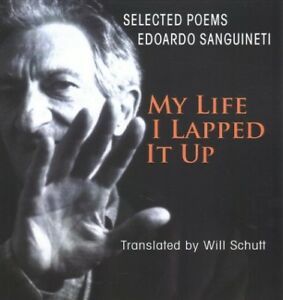In Their Own Words
Will Schutt on Edoardo Sanguineti’s “What do you do?”

"what do you do?"
" what do you do? (they often ask me): I say nothing back (sometimes): or else
I say instead (sometimes): nothing:
other times I say: too many things to tell you
(but nothing that matters: and nothing that matters to me): (considering that,
shillyshallying, nothing matters to me): (I'm merely following, oftentimes,
this hushed hush-hush of a whisper whirring inside me, weakly, no longer even
turning into word, phrase, verse):
I seek an end, in the end:
From My Life I Lap It Up (Oberlin College Press, 2018). All rights reserved. Reprinted with the permission of the translator.
On Edoardo Sanguineti’s “What do you do?”
The Italian avant-garde poet Edoardo Sanguineti often found models for his poems in other art forms. "[M]y private appeal to other artistic situations," he wrote in an essay in 1961, "was a way of breaking, in solitude, poetic solitude itself." In addition to novels, plays, critical essays, translations and many collections of poetry written over a career spanning 50-plus years, Sanguineti frequently collaborated with painters and musicians, and wrote several libretti for the composer Luciano Berio.
About one visual artist, Sanguineti once remarked that all of his work could be seen as "una pittura ininterrotta" (or one uninterrupted painting). You might describe Sanguineti's own work as one uninterrupted poem, given his resistance to closure and his tendency to write long sequences, many of which bear titles like Travel Pictures, Postcards, Daybook. The sense of continuousness in Sanguineti's poetry is heightened by his unusual punctuation: On the one hand, parentheticals, which either qualify or depart from the body of the poem. On the other, colons, which suggest that some list or enumeration is to follow, that another beginning is on its way. Arresting as many of his individual poems are, it is challenging to study them in isolation.
In spite of that, for many years I have found myself circling one poem of his in particular. It was the first, in fact, that most captured my interest, and it appears in his book Rebus, published in 1987. The poem begins with the question "What do you do?" It's a question all of us have asked or have been asked, and for which we probably have a ready answer. Yet this speaker declines to provide their own ("I say nothing back"), makes light of the question ("I say instead…nothing"), replies—out of exasperation?—"too many things."
The poem spins something out of nothing; develops by refusing to develop. Rather than frustrated, I feel unavoidably drawn to all that the poem doesn't disclose, all that I don't understand about it. Who are these people asking the question? Who is being asked? Should the poem be read as a wry response to the seriousness with which we regard our vocation? Or a sincere transcription of indecision? The poem won't say. It remains suspended, a vehicle for its own vacillation.
On its face, "What do you do?" is an atypical Sanguineti poem. There's little wordplay, no mistilinguismo (multilingualism). That I can tell, there are no allusions. And there are clearly no travels or brief encounters chronicled. It may be one of his easiest poems to translate. All those "nothings" and "matters." The greatest challenges come in lines five and six, as the language grows more playful. In the fifth line Sanguineti describes what he does as "tira e molla," literally, "pull and release." The phrase can refer to games like tug of war, on-again/off-again relationships, wishy-washiness. In line six, the poem snowballs into near gibberish: "basso bisbis di un bisbidis." I think I've managed to bring over into English some of the sound effect with "hushed hush-hush of a whisper."
Yet I have the nagging sensation—too late now—that my translation of the last line fails to do justice to the original. "Cerco una conclusione, finalmente," writes Sanguineti. "I seek a conclusion, finally." Where the original is blunt and anti-lyrical my translation is poetic and repetitious: "I seek an end in the end." Probably, unlike Sanguineti, I haven't shaken the sounds of line six. So it goes. Translators, too, keep running hot and cold.


